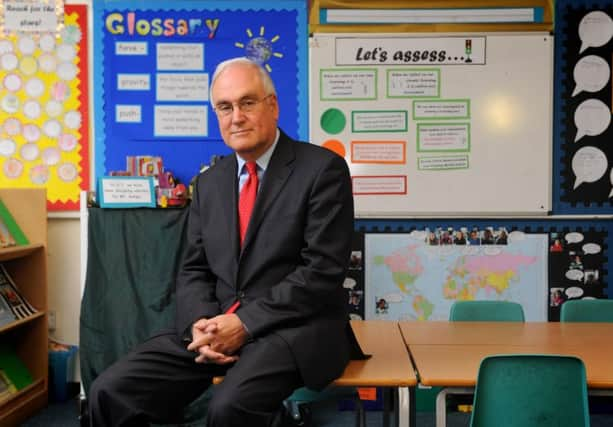Ofsted boss calls for sanctions for primary schools '˜failing bright pupils'


Sir Michael Wilshaw said that thousands of the most academically able primary school pupils are being let down by a “chronic lack of ambition” among some teachers.
Children from poor backgrounds are particularly at risk of underachievement because teachers are more focusing on GCSE pupils on the crucial C/D borderline rather than supporting the most able to secure the top A/A* grades, he said today.
Advertisement
Hide AdAdvertisement
Hide AdHe suggested primary schools should face “further sanctions” if they “consistently fail their brightest pupils”. Currently, schools can be placed under special measures if inspection reports identify areas of major concern. Sir Michael said: “This might seem draconian but unless we get this right as a nation, we will not only continue to let down thousands of our most able pupils but also thwart any ambition to match the productivity levels of our international competitors.”
He also called on the Government to consider reintroducing external national testing for 13 and 14-year-olds, adding: “I firmly believe it was a mistake to abolish these tests in the first place”.
He said rigorous testing in primary schools was key to helping tackle the attainment gap between poorer pupils and their peers, something he described as a “national scandal”.
“As chief inspector, I have consistently lamented the failure of too many secondary schools to stretch our most able children, particularly the poorest. If our nation is serious about improving social mobility then our secondary schools have got to start delivering for these children.”
Advertisement
Hide AdAdvertisement
Hide AdSir Michael, who is set to stand down in December, said there was a “depressing” trend of the brightest children from disadvantaged backgrounds being the most likely not to achieve their full potential, based on their academic progress between primary and secondary school levels.
An investigation found that of the most able children from poorer backgrounds attending a non-selective secondary school, 64 per cent achieved a top grade (B or above) in GCSE maths, compared with 81 per cent of others.
Some 66 per cent of those from a disadvantaged background achieved a top grade in GCSE English - well behind the 79 per cent of those who were not disadvantaged to achieved a B or higher.
Sir Michael said: “Our nation’s economic prosperity depends on harnessing the talent of all our young people but especially those who have the potential to be the next generation of business leaders, wealth generators and job creators.
Advertisement
Hide AdAdvertisement
Hide Ad“As a nation, we have a problem with low productivity. The fact that so many of our poorer bright children are being deprived of the opportunity to fulfil their early promise must surely be one of the underlying causes of this.”
“If we are serious about helping all disadvantaged children, but especially the most able, to learn well and unlock their full potential, we need to know how they are doing at 14 as well as at seven, 11 and 16.”
A Department for Education (DfE) spokesman said the Government’s reforms “are raising standards for all children”, with 1.4m more pupils in good or outstanding schools than in 2010.
The DfE added: “Like Sir Michael Wilshaw, we recognise that more needs to be done to ensure the most able children fulfil their vast potential.
Advertisement
Hide AdAdvertisement
Hide Ad“That is why we are introducing new world-class GCSEs that will stretch the brightest pupils. Alongside this, academies and innovative free schools, such as the King’s Maths School, which offers young mathematicians and scientists the opportunity to study alongside leading academic experts, are giving every child the opportunity to fulfil their potential.
“However we are not complacent, and that is why our recent White Paper goes even further by committing to investigating and funding approaches to help even more bright children fulfil their vast potential.”